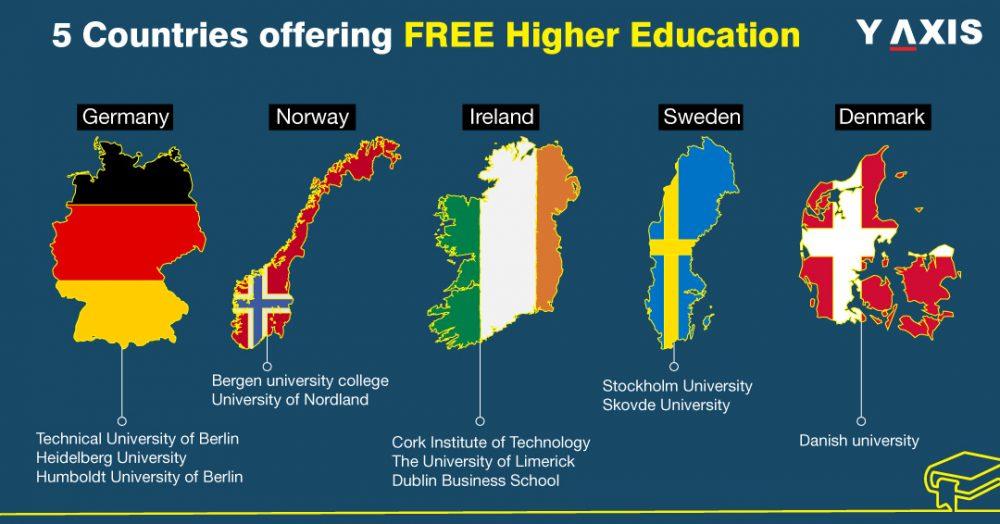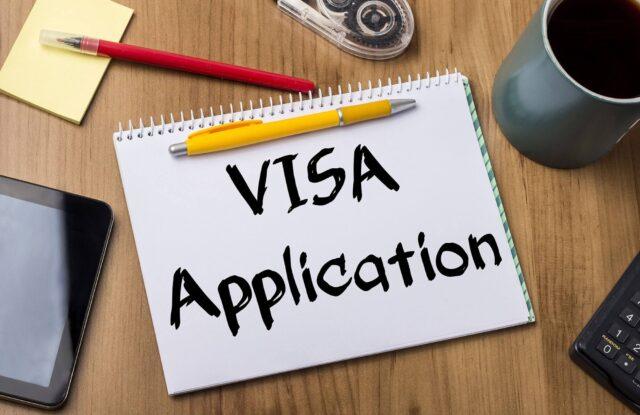

Free education countries are nations that provide tuition-free or highly subsidized education to students. Are you dreaming of pursuing higher education but worried about the cost? Fortunately, there are several countries around the world that offer free education opportunities to both local and international students.
Read Studying Medicine: Scholarship to Study Medicine in any European Country
In this article, we will explore the concept of free education countries, highlight the top countries that provide this benefit, discuss important factors to consider when choosing a study destination, and provide useful tips for studying abroad. So, let’s dive in and discover the best free education countries!
Introduction
Education plays a vital role in personal and professional growth. It equips individuals with knowledge, skills, and opportunities for a brighter future. However, access to education is not equal worldwide, and many aspiring students face financial constraints when pursuing their educational goals. That’s where the concept of free education countries comes into play.
Read 10 Unique and Different Types of Gym Business
Importance of Education
Education is the key to unlocking a world of possibilities. It empowers individuals, promotes social mobility, and fosters economic development. A well-educated population contributes to innovation, progress, and overall societal well-being. Recognizing the significance of education, some countries have taken steps to provide accessible and affordable education to their citizens and international students.
Access to Education Worldwide
While education is considered a fundamental right, not everyone has equal access to it. Many countries struggle to provide quality education due to various challenges such as limited resources, infrastructure, and political instability. This creates barriers for individuals seeking educational opportunities. However, certain countries have made commendable efforts to bridge this gap by offering free education, making it possible for students from diverse backgrounds to pursue their academic aspirations.
Read Without Block Account Can I Study in Germany for Free in 2023?
The Concept of Free Education Countries
Free education countries refer to the provision of education without charging tuition fees or with minimal costs. It aims to remove financial barriers and promote equal opportunities for all students. Free education countries often prioritize investing in their education systems to ensure high-quality instruction and comprehensive support services. Now, let’s explore some of the top countries that offer free education to both domestic and international students.
Free Education Countries
Read 16 Best Student Cities in Europe in 2023
Definition and Benefits
Tuition-free or heavily subsidized education is provided to students in free education countries. By choosing to study in these countries, students can save on tuition fees and focus on their academic pursuits. Moreover, studying in a free education country offers exposure to diverse cultures, enhances language skills, and provides opportunities for personal growth and global networking.


Top Countries Offering Free Education
- Germany: Germany is renowned for its commitment to providing free education to both domestic and international students. Public universities in Germany offer tuition-free education, allowing students to pursue undergraduate and postgraduate programs without paying tuition fees. However, students may need to cover living expenses and administrative fees.
- Norway: Norway is another country known for its tuition-free education system. Norwegian universities and state colleges do not charge tuition fees for international students, regardless of their nationality. However, students should consider the cost of living in Norway, which can be relatively high.
- Sweden: Sweden offers tuition-free education for EU/EEA and Switzerland citizens. Additionally, some Swedish universities provide free education to international students outside the EU/EEA through scholarships or other programs. It’s important to research the specific eligibility criteria and available options.
- Finland: Finland is renowned for its high-quality education system and offers tuition-free education to both EU/EEA and non-EU/EEA students at public universities and institutions. Students are only required to pay a small administrative fee, and there are also scholarships available to cover living expenses.
- Denmark: Denmark provides free education to EU/EEA and Swiss citizens. Non-EU/EEA students can also access free education through scholarships and tuition waivers offered by Danish universities. Students may still need to cover living expenses, but the education itself is tuition-free.
- Italy: Italy offers free or low-cost education to EU/EEA and non-EU/EEA students. Public universities in Italy charge minimal to no tuition fees, making it an attractive destination for students seeking affordable education. However, students should consider the cost of living in different cities in Italy.
Read IELTS Fee In Pakistan 2023 – Tips For IELTS Preparation
It’s important to note that while these countries offer free or low-cost education, students may still need to budget for living expenses, accommodation, books, and other personal costs. Additionally, specific eligibility requirements and application processes may vary for each country and institution. It’s crucial to thoroughly research the options available and consult official university websites or education agencies for the most accurate and up-to-date information.
Factors to Consider
When choosing a study destination, several factors come into play. Here are a few important things to remember:
Quality of Education
While free education is an attractive proposition, it’s essential to evaluate the quality of education offered by the country. Look for universities with accreditation, reputable faculty, and strong academic programs. Consider factors such as university rankings, student satisfaction, and graduate employability.
Cost of Living
While tuition fees may be covered, it’s crucial to consider the cost of living in the chosen country. Look into accommodation, transportation, healthcare, and daily expenses. Some free education countries offer affordable housing options or provide assistance to students, ensuring a comfortable and affordable living experience.
Read Study In Finland For Pakistani Students
Language Barriers
If you plan to study in a country where English is not the primary language, consider the language requirements. Some countries offer programs taught in English, while others may require proficiency in the local language. Evaluate your language skills and determine if language courses or support services are available.
Work Opportunities
Explore the work opportunities available to international students in the chosen country. Some countries allow students to work part-time during their studies, which can help cover living expenses and gain valuable work experience. Consider the job market, internship opportunities, and post-graduation work options.
Tips for Studying Abroad
Studying abroad may be both exciting and life-changing. To make the most of your journey, consider the following tips:
Read Study in Germany from Pakistan
Scholarships and Grants
Research scholarships and grants specifically designed for international students. Many free education countries offer financial assistance to help cover living expenses, travel costs, and even tuition fees. Explore scholarship opportunities and apply early to increase your chances of receiving funding.
Preparing for Cultural Differences
Living in a foreign country means embracing a new culture and adapting to different customs. Take the time to learn about the local culture, traditions, and social norms. This will not only help you integrate better but also enrich your overall experience.
Read European Scholarships for Pakistani Students
Researching Universities
Thoroughly research the universities and their academic programs. Consider factors such as curriculum, faculty expertise, research opportunities, and student support services. Look for universities that align with your academic goals and interests.
Applying for Visas


When planning to study in a foreign country, one of the crucial steps is to understand the visa requirements and navigate the visa application process. Here are some key points to consider when applying for visas:
Read Dubai To Italy Study and Work Visa Process in 2023
- Research Visa Requirements: Start by researching the specific visa requirements for studying in your chosen free education country. Each country may have different visa categories for students, and it’s important to understand the eligibility criteria, documentation, and deadlines.
- Student Visa Types: Determine the type of student visa you need to apply for. Some countries may have specific student visa subclasses or categories based on the duration and level of study. Common types include the Student Visa, Study Permit, or Student Residence Permit.
- Admission Letter and Confirmation of Enrollment: In most cases, you will need to have an admission letter or confirmation of enrollment from a recognized educational institution in the country you plan to study. This letter serves as proof of your acceptance and outlines the details of your program.
- Financial Documentation: Many countries require proof of sufficient funds to cover your tuition fees and living expenses during your stay. This may involve submitting bank statements, scholarship letters, or financial sponsorship documents. Ensure you meet the financial requirements specified by the immigration authorities.
- Health and Insurance: Some countries may require you to undergo a medical examination to ensure you meet the health standards for entry. Additionally, it’s essential to have adequate health insurance coverage for the duration of your stay. Research the specific health and insurance requirements and make necessary arrangements.
- Visa Application Form: Ensure precise and comprehensive completion of the visa application form, diligently attending to all necessary details, including required information, supporting documents, and any supplementary forms or declarations. Prior to submission, thoroughly review your application to prevent any inadvertent errors or omissions
- Application Submission: Follow the guidelines provided by the embassy or consulate of your chosen country. Submit your application along with the required documents within the designated timeframe. It’s advisable to keep copies of all your application materials for future reference.
- Visa Processing Time: Visa processing times can vary depending on the country and time of year. Apply well in advance to allow for any potential delays. Stay informed about the progress of your application and follow up if necessary.
- Visa Interview: You may be needed to attend a visa interview in some instances. Prepare for the interview by reviewing your application, understanding your study plans, and being ready to answer any questions related to your study intentions, finances, and future goals.
- Travel Arrangements: Once your visa is approved, make appropriate travel arrangements, including booking flights, arranging accommodations, and organizing transportation to your destination.
Read Apply for Italy Study Visa Soon: Pre-Enrollment Open For 2023-24
Remember, visa requirements and processes can change, so it’s important to regularly check the official websites of the embassy or consulate of your chosen country for the most up-to-date information. Seek guidance from the educational institution you will be attending or consult with a qualified immigration advisor for personalized advice and assistance.
Applying for a visa can be a crucial step in your study abroad journey, so be sure to start the process early, gather all the required documents, and stay organized throughout the application process.
Final Words About the Free Education Countries
In conclusion, exploring the best free education countries opens up incredible opportunities for students worldwide. These countries prioritize accessible and affordable education, allowing individuals to pursue their academic goals without the burden of high tuition fees. Consider factors such as the quality of education, cost of living, language requirements, and work opportunities when choosing a study destination.
Remember to research scholarships and grants, prepare for cultural differences, and thoroughly evaluate universities and their programs. Studying abroad in a free education country not only broadens your knowledge but also enhances your global perspective and personal growth. So, embrace the possibilities and embark on a fulfilling educational journey!
Read No Application Fee Universities List
Watch YouTube Video
FAQs
1. Can international students apply for free education in these countries?
Yes, many free education countries welcome international students and provide them with the opportunity to pursue education without tuition fees or with minimal costs.
2. Are there any English-taught programs available in these free education countries?
Absolutely! Many free education countries offer a wide range of programs taught in English to cater to the needs of international students.
3. Do these countries provide scholarships or financial aid for living expenses?
Yes, several free education countries offer scholarships and financial aid options specifically designed for international students to help cover their living expenses.
4. What are the language requirements for studying in these countries?
Language requirements vary depending on the country and the program of study. While some countries offer programs taught in English, others may require proficiency in the local language. It’s important to check the language requirements of your chosen university.
5. Can students work part-time while studying in these free education countries?
In many cases, international students are allowed to work part-time during their studies to support themselves. However, it’s important to check the specific work regulations and restrictions of the country you plan to study in.







11 Comments